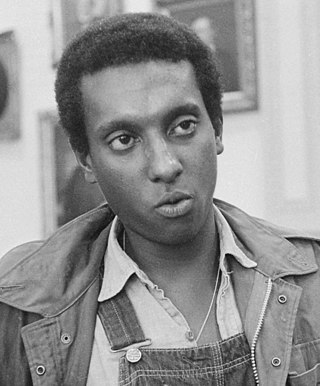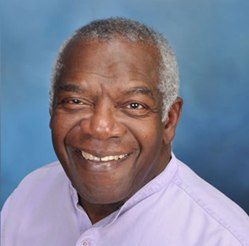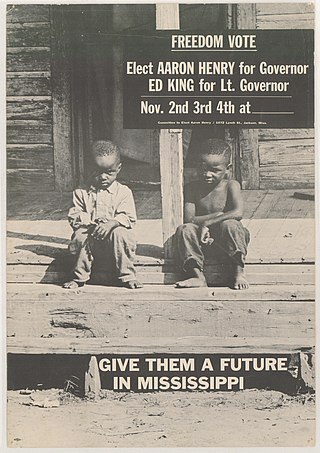
The Student Nonviolent Coordinating Committee was the principal channel of student commitment in the United States to the civil rights movement during the 1960s. Emerging in 1960 from the student-led sit-ins at segregated lunch counters in Greensboro, North Carolina, and Nashville, Tennessee, the Committee sought to coordinate and assist direct-action challenges to the civic segregation and political exclusion of African Americans. From 1962, with the support of the Voter Education Project, SNCC committed to the registration and mobilization of black voters in the Deep South. Affiliates such as the Mississippi Freedom Democratic Party and the Lowndes County Freedom Organization in Alabama also worked to increase the pressure on federal and state government to enforce constitutional protections.

Kwame Ture was an American activist who played a major role in the civil rights movement in the United States and the global pan-African movement. Born in Trinidad in the Caribbean, he grew up in the United States from the age of 11 and became an activist while attending the Bronx High School of Science. He was a key leader in the development of the Black Power movement, first while leading the Student Nonviolent Coordinating Committee (SNCC), then as the "Honorary Prime Minister" of the Black Panther Party, and last as a leader of the All-African People's Revolutionary Party (A-APRP).

The Southern Christian Leadership Conference (SCLC) is an African-American civil rights organization based in Atlanta, Georgia. SCLC is closely associated with its first president, Martin Luther King Jr., who had a large role in the American civil rights movement.

Ella Josephine Baker was an African-American civil rights and human rights activist. She was a largely behind-the-scenes organizer whose career spanned more than five decades. In New York City and the South, she worked alongside some of the most noted civil rights leaders of the 20th century, including W. E. B. Du Bois, Thurgood Marshall, A. Philip Randolph, and Martin Luther King Jr. She also mentored many emerging activists, such as Diane Nash, Stokely Carmichael, and Bob Moses, as leaders in the Student Nonviolent Coordinating Committee (SNCC).

Doris Adelaide Derby was an American activist and documentary photographer. She was the adjunct associate professor of anthropology at Georgia State University and the founding director of their Office of African-American Student Services and Programs. She was active in the Mississippi civil rights movement, and her work discusses the themes of race and African-American identity. She was a working member of the Student Nonviolent Coordinating Committee (SNCC) and co-founder of the Free Southern Theater. Her photography has been exhibited internationally. Two of her photographs were published in Hands on the Freedom Plow: Personal Accounts by Women in SNCC, to which she also contributed an essay about her experiences in the Mississippi civil rights movement.
Jack Minnis (1926-2005) was an American activist, and the founder and director of opposition research for the Student Nonviolent Coordinating Committee in the Civil Rights Movement era. Minnis researched federal expenditures and state and local subversion of racial equality. Minnis was white, but remained affiliated with SNCC even after it adopted a "blacks only" personnel policy, its only white employee for a long time. He helped to train such workers as Stokely Carmichael, Marion Barry, and John Lewis.

Bernard LafayetteJr. is an American civil rights activist and organizer, who was a leader in the Civil Rights Movement. He played a leading role in early organizing of the Selma Voting Rights Movement; was a member of the Nashville Student Movement; and worked closely throughout the 1960s movements with groups such as the Student Nonviolent Coordinating Committee (SNCC), the Southern Christian Leadership Conference (SCLC), and the American Friends Service Committee.

Charles Melvin Sherrod was an American minister and civil rights activist. During the civil rights movement, Sherrod helped found the Albany Movement while serving as field secretary for southwest Georgia for the Student Nonviolent Coordinating Committee. He also participated in the Selma Voting Rights Movement and in many other campaigns of the civil rights movement of that era.
The Southern Student Organizing Committee (SSOC) was a student activist group in the southern United States during the 1960s, which focused on many political and social issues including: African-American civil rights, opposition to the Vietnam War, workers' rights, and feminism. It was intended, in part, to be Students for a Democratic Society (SDS) for Southerners and Student Nonviolent Coordinating Committee (SNCC) for white students – at a time when it was dangerous for SDS to attempt to organize in the Deep South and when SNCC was starting to discuss expelling white volunteers. It was felt that students at the traditionally white and black colleges in the South could be more effectively organized separately than in an integrated student civil rights organization; however, this was controversial and initially opposed by advisors like Anne Braden. Sue Thrasher and Archie Allen of the Christian Action Fellowship were among the founders of the group, with the support of Bob Moses and others. At its inception, the group had close ties to controversial Louisville, Kentucky radicals Carl and Anne Braden and their organization, the Southern Conference Education Fund, but a deliberate effort was later made to put some distance between the SSOC and the Bradens to avoid the appearance that the SSOC was a Communist front.
The Atlanta Student Movement was formed in February 1960 in Atlanta by students of the campuses Atlanta University Center (AUC). It was led by the Committee on the Appeal for Human Rights (COAHR) and was part of the Civil Rights Movement.
Hollis Watkins was an American activist who was part of the Civil Rights Movement activities in the state of Mississippi during the 1960s. He became a member and organizer with the Student Nonviolent Coordinating Committee (SNCC) in 1961, was a county organizer for 1964's "Freedom Summer", and assisted the efforts of the Mississippi Freedom Democratic Party to unseat the regular Mississippi delegation from their chairs at the 1964 Democratic Party national convention in Atlantic City. He founded Southern Echo, a group that gives support to other grass-roots organizations in Mississippi. He also was a founder of the Mississippi Veterans of the Civil Rights Movement.

Judy Richardson is an American documentary filmmaker and civil rights activist. She was Distinguished Visiting Lecturer of Africana Studies at Brown University.

Charles E. "Charlie" Cobb Jr. is a journalist, professor, and former activist with the Student Nonviolent Coordinating Committee (SNCC). Along with several veterans of SNCC, Cobb established and operated the African-American bookstore Drum and Spear in Washington, D.C., from 1968 to 1974. Currently he is a senior analyst at allAfrica.com and a visiting professor at Brown University.

Charles "Chuck" McDew was an American lifelong activist for racial equality and a former activist of the Civil Rights Movement. After attending South Carolina State University, he became the chairman of the Student Nonviolent Coordinating Committee (SNCC) from 1960 to 1963. His involvement in the movement earned McDew the title, "black by birth, a Jew by choice and a revolutionary by necessity" stated by fellow SNCC activist Bob Moses.
The Dallas County Voters League (DCVL) was a local organization in Dallas County, Alabama, which contains the city of Selma, that sought to register black voters during the late 1950s and early 1960s.

Brenda Travis is an African American veteran of the Civil Rights Movement from McComb, Mississippi, whose imprisonments for protesting a segregated bus station and participation in a peaceful high school walk out in 1961 helped catalyze public sentiment against segregation.

The sit-in movement, sit-in campaign, or student sit-in movement, was a wave of sit-ins that followed the Greensboro sit-ins on February 1, 1960, led by students at North Carolina Agricultural and Technical Institute (A&T). The sit-in movement employed the tactic of nonviolent direct action and was a pivotal event during the Civil Rights Movement.

Dorie Ann Ladner was an American civil rights activist and social worker. Along with her sister Joyce, she was a leading community organizer in Mississippi for the National Association for the Advancement of Colored People (NAACP) and Student Nonviolent Coordinating Committee (SNCC) during the 1960s. She was a key organizer of the Freedom Summer Project, which promoted voter registration for African Americans in Mississippi. She participated in the March on Washington and the March from Selma to Montgomery.
Sandra Cason Hayden was an American radical student activist and civil rights worker in the 1960s. Recognized for her defense of direct action in the struggle against racial segregation, in 1960 she was an early recruit to Students for a Democratic Society (SDS). With Student Nonviolent Coordinating Committee (SNCC) in Mississippi, Hayden was a strategist and organizer for the 1964 Freedom Summer. In the internal discussion that followed its uncertain outcome, she clashed with the SNCC national executive.

The Freedom Vote, also known as the Freedom Ballot, Mississippi Freedom Vote, Freedom Ballot Campaign, or the Mississippi Freedom Ballot, was a 1963 mock election organized in the U.S. state of Mississippi to combat disenfranchisement among African Americans. The effort was organized by the Council of Federated Organizations (COFO), a coalition of Mississippi's four most prominent civil rights organizations, with the Student Nonviolent Coordinating Committee (SNCC) taking a leading role. By the end of the campaign, over 78,000 Mississippians had participated. The Freedom Vote directly led to the creation of the Mississippi Freedom Democratic Party (MFDP).














